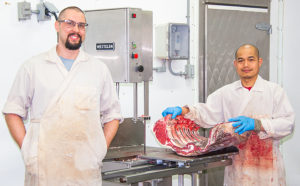
Killarney Meats’ orders are coming in by ‘leaps and bounds’ as COVID-19 spread cripples national processors
BY KIM LANGEN
It’s all hands on deck at the local abattoir, as demand for beef and pork increases in the dismal face of large processor closures.
“We are booked ahead, as far ahead as I have ever seen it,” said Ian Jensen, co-owner of Killarney Meats. “We’re booked up to the end of August. This time of year we would be booked maybe four weeks ahead. It’s pretty incredible.”
Both Canada and the U.S. have seen the pandemic virus, COVID-19, spread like wildfire through a number of major meat processing plants, leaving hundreds of workers infected with the novel coronavirus, and even a number of deaths.
The emergency has led to closures of Cargill plants in both Alberta and Quebec, with workers furloughed.
And this hiatus in the stream of Canadian killing and processing in abattoirs has set off a chain of events, leaving many producers of cattle and beef in a tight spot when it comes to marketing their animals – especially those with finished animals.
And that’s where local abattoirs like Killarney Meats have recently come into their own.
“Local direct marketers, who sell their products in places like Winnipeg, are bringing in more animals, and local guys are butchering for their families and friends,” said Jensen.
Killarney Meats, on South Railway, includes a small retail space in the entrance to their facility, with freezers and a fridge laid out with locally produced meat products.
But they are having trouble keeping those shelves filled, as demand for meat has cranked up.
“Our retail sales here have probably tripled, or even quadrupled since the first of April,” said Jensen. “Mostly we are getting bulk buys. We introduced meat packages in early April, and we have had orders coming in by leaps and bounds. We had no idea the meat packages would be so popular.”
Jensen, a qualified chef, says he has been working 10 to 12 hours a day, five days a week, since things heated up in the abattoir. The morning often starts with sausage-making, one of the shop’s top gourmet picks, he said.
“What’s the biggest overall seller? Ground beef,” he said. “Everybody is after the beef. And ground beef feeds a lot of people, plus you can do a lot of things with it.”
Killarney Meats processes eight or nine head of cattle each week in the modern, government-inspected plant, plus six to ten pigs, some sheep, and other livestock and game as requested. Four full-time workers get the job done, and they are probably ‘twice as busy’ as usual, said Jensen.
Killarney Meats, at 604 Railway Street, is open Monday to Friday, from 8:30 a.m. to 5 p.m., and is open through lunch. You can check out their meat packs and prices (such as ordering a quarter of beef, or side of pork) on their Facebook page. For information, you can call them at 204-523-4308.

BEEF IN BIG DEMAND – Co-owners of Killarney Meats, Ian Jensen (left) and Ronilo Sardal (right), say they have been run off their feet keeping up with local demand for beef, pork, and other meat items. Things kicked off in early April, following the announcement of a global pandemic, and business has almost quadrupled since then, they said. Butchering orders are booked up through to the end of August, and new meat pack deals for customers are flying off the shelves.

SHARPEST KNIFE IN THE DRAWER – Ronilo Sardal, co-owner of Killarney Meats, was just finishing cutting up a fine beef carcass, and sharpening his knife in readiness for the next job on his list Tuesday afternoon. Sardal, who also holds a degree in electronic engineering, first honed his knife skills in the Philippines, working in his grandfather’s butcher shop.

A MASTER OF THE SAUSAGE – Ian Jensen is also a trained chef, and a master of the tasty sausage. He has worked with local direct marketers to help develop some amazing flavours for their products, and also produces in-house products for shoppers. The job of sausage making often takes place early in the morning, before the rest of the crew comes onto shift at the busy facility.

